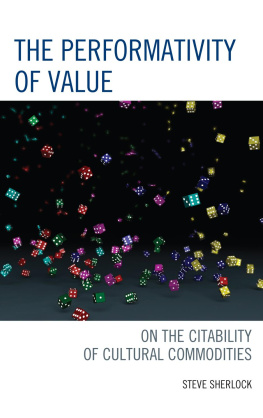Sherlock - The Performativity of Value
Here you can read online Sherlock - The Performativity of Value full text of the book (entire story) in english for free. Download pdf and epub, get meaning, cover and reviews about this ebook. year: 2012, publisher: Lexington Books, genre: Romance novel. Description of the work, (preface) as well as reviews are available. Best literature library LitArk.com created for fans of good reading and offers a wide selection of genres:
Romance novel
Science fiction
Adventure
Detective
Science
History
Home and family
Prose
Art
Politics
Computer
Non-fiction
Religion
Business
Children
Humor
Choose a favorite category and find really read worthwhile books. Enjoy immersion in the world of imagination, feel the emotions of the characters or learn something new for yourself, make an fascinating discovery.
- Book:The Performativity of Value
- Author:
- Publisher:Lexington Books
- Genre:
- Year:2012
- Rating:5 / 5
- Favourites:Add to favourites
- Your mark:
- 100
- 1
- 2
- 3
- 4
- 5
The Performativity of Value: summary, description and annotation
We offer to read an annotation, description, summary or preface (depends on what the author of the book "The Performativity of Value" wrote himself). If you haven't found the necessary information about the book — write in the comments, we will try to find it.
Sherlock: author's other books
Who wrote The Performativity of Value? Find out the surname, the name of the author of the book and a list of all author's works by series.
The Performativity of Value — read online for free the complete book (whole text) full work
Below is the text of the book, divided by pages. System saving the place of the last page read, allows you to conveniently read the book "The Performativity of Value" online for free, without having to search again every time where you left off. Put a bookmark, and you can go to the page where you finished reading at any time.
Font size:
Interval:
Bookmark:
The Performativity of Value
The Performativity of Value
On the Citability of Cultural Commodities
Steve Sherlock
LEXINGTON BOOKS
Lanham Boulder New York Toronto Plymouth, UK
Published by Lexington Books
A wholly owned subsidiary of Rowman & Littlefield
4501 Forbes Boulevard, Suite 200, Lanham, Maryland 20706
www.rowman.com
10 Thornbury Road, Plymouth PL6 7PP, United Kingdom
Copyright 2014 by Lexington Books
All rights reserved. No part of this book may be reproduced in any form or by any electronic or mechanical means, including information storage and retrieval systems, without written permission from the publisher, except by a reviewer who may quote passages in a review.
British Library Cataloguing in Publication Information Available
Library of Congress Cataloging-in-Publication Data
Sherlock, Steve, 1958
The performativity of value : on the citability of cultural commodities / Steve Sherlock.
p. cm.
Includes bibliographical references and index.
ISBN 978-0-7391-6861-5 (cloth) ISBN 978-0-7391-6862-2 (electronic)
1. Value. 2. Group identity. 3. Commercial products. I. Title.
HB201.S563 2014
306.3'4dc23
2013045646
 TM The paper used in this publication meets the minimum requirements of American National Standard for Information Sciences Permanence of Paper for Printed Library Materials, ANSI/NISO Z39.48-1992.
TM The paper used in this publication meets the minimum requirements of American National Standard for Information Sciences Permanence of Paper for Printed Library Materials, ANSI/NISO Z39.48-1992.
Printed in the United States of America
I would like to thank Lexington Press for publishing this book. I would particularly like to thank Jana Hodges-Kluck, my editor at Lexington Press, for her expertise and time spent on this project, and her patience in bringing it to publication. I would like to thank my production editor, Catherine Mudge, as well as all the others associated with Lexington Press who worked on this project. I also thank the anonymous reviewers of this manuscript for contributing their time and helpful insights.
I would also like to acknowledge funding by the National Endowment of the Humanities for two summer seminars which contributed to my development as a scholar. The first was conducted in 1995 by Dr. Samuel Weber at UCLA, entitled From the Work of Art to the Serializing of the Media: Communication and Signification in Walter Benjamin and Other Theorists. The second was conducted in 2001 by Dr. Alex Gelley at UC-Irvine, entitled Walter Benjamins Arcades Project: Commodity Fetishism and the Aesthetics of the City. I would like to thank both Dr. Weber and Dr. Gelley for these seminars, both of which contributed to my understanding of critical social theory and poststructuralism. I would also like to thank the graduate faculty at Notre Dame during my formative years of learning social theoryespecially Dr. Fabio Dasilva and Dr. Fred Dallmayr.
I would like to thank the administration at Saginaw Valley State University for sabbatical support for this project. I also thank the administration, university faculty, my department colleagues, and the support staff at Saginaw Valley for their help and friendship over my career at the university.
Finally, I would like to thank all of my family members for their ongoing support and assistance, and I would especially like to thank my love, Michele, for her consideration and encouragement while I wrote this book.
Just as scholars might directly quote, or paraphrase, the words of Shakespeare into their own workas Erving Goffman (1959) does in developing his theory of dramaturgy, or Jacques Derrida (1994) in his work on Marxsocial actors routinely cite cultural commodities in everyday life. In fact, Shakespeares words and works have themselves become cultural commodities circulating in the marketplace, purchased and cited by consumers seeking to valorize the situation into which they are recontextualized. The exchange value (Marx 1967) of such a cultural commodity derives not only from its function in delivering another value, such as literary value, into the new situational context, but also from its use as a citational resource for the identity construction of the subjects involved.
As Mikhail Bakhtin and his associates argued, the words of othersas meaningful signs which pre-exist their usersare continually incorporated into the utterances of the self (Voloinov 1986). For the Bakhtin Circle, the subject necessarily takes an evaluative stance toward these words of the other, as they are configured into particular syntactical formations within the utterances of self. Subjects can report on the words of co-present or distant others with approval or disdain, taking evaluative stances toward their implied cultural values. For V. N. Voloinov, reported speech is speech about speech (115; italics in the original), as in the case of a direct quote or a paraphrase of the words of others. However, in a more general sense, the very selection of particular words of others, in order to formulate ones own utterances, is already a kind of reported speechin that subjects make evaluative choices regarding which words of others to report upon. The words of others come to subjects with historically sedimented meanings and values, available as resources to incorporate into their own evaluative utterances.
This process can be seen as a kind of citational practice, where selected words of others are cited, or grafted (Derrida 1988, 12), into the reporting utterances of the self. Bakhtin and his colleagues argued that every material, syntactically configured utterance issued by a subject not only enacts a relationship with others, but a relationship between the values of self and those of others (Voloinov 1976; Holquist 2004; MacCannell 1985). The citation of the words and images of the other thus involves a continual re-negotiation of social values in everyday life. Given that language has itself increasingly become a cultural commodity within post-industrial economiesdistributed in formats such as television shows, websites, films, or booksthe commodified words of others can be reported upon, and evaluated, when re-cited by the subject.
In this book, the contributions of the Bakhtin Circle on reported speech are moved into a framework of performative citationality, as developed through the work of Jacques Derrida and Judith Butler (see Derrida 1988; Butler 1993, 12; Nakassis 2012, 635). Using the work of the Bakhtin Circle, Butlers formulation regarding the performative citationality of gender is extended to the performative citationality of valueespecially the re-citation of exchange value in everyday life. The first section of this book develops the theoretical frame which will be used. The second section applies the theoretical frame to the description of the contemporary U.S. cultural economy, while the third section applies the frame to its critique.
Jacques Derrida (1988) famously argued, in his discussion of John Austins work on linguistic performatives, that any mark must be recognizable across social contexts in order to be meaningfuland thus is inherently separable from the intentionality of any particular subject. For Derrida, words or gestures, although uniquely singular in context, must also be repeatable and recognizable across contexts in order to have social meaning. He calls this unresolvable tension, between the singularity and repeatability of language, the iterability of language (7; 10).
Another way Derrida says this is that language must be citable across social contextsspatially and temporally separable from the presence of the intentional subject who first utters or writes the words. Meaning must be abstractable from a situated use by an individual subject, and thus is beyond the intentional control of that subject. Words can be re-cited and re-interpreted by audiences in ways never intended by subjects. Thus, meaning can never be finally fixed, and is endlessly deferrable into unknown future contexts. In Derridas terms, meaning is never quite present, as assumed in the tradition of Western metaphysics (Derrida 1973; 1981). Derrida considers this insight to be applicable to any meaningful identity, including the social identity of subjects. Because any identity must be repeatable across contexts in order to be socially meaningful, it cannot be identical with itself across those differing spatial and temporal contexts.
Next pageFont size:
Interval:
Bookmark:
Similar books «The Performativity of Value»
Look at similar books to The Performativity of Value. We have selected literature similar in name and meaning in the hope of providing readers with more options to find new, interesting, not yet read works.
Discussion, reviews of the book The Performativity of Value and just readers' own opinions. Leave your comments, write what you think about the work, its meaning or the main characters. Specify what exactly you liked and what you didn't like, and why you think so.









